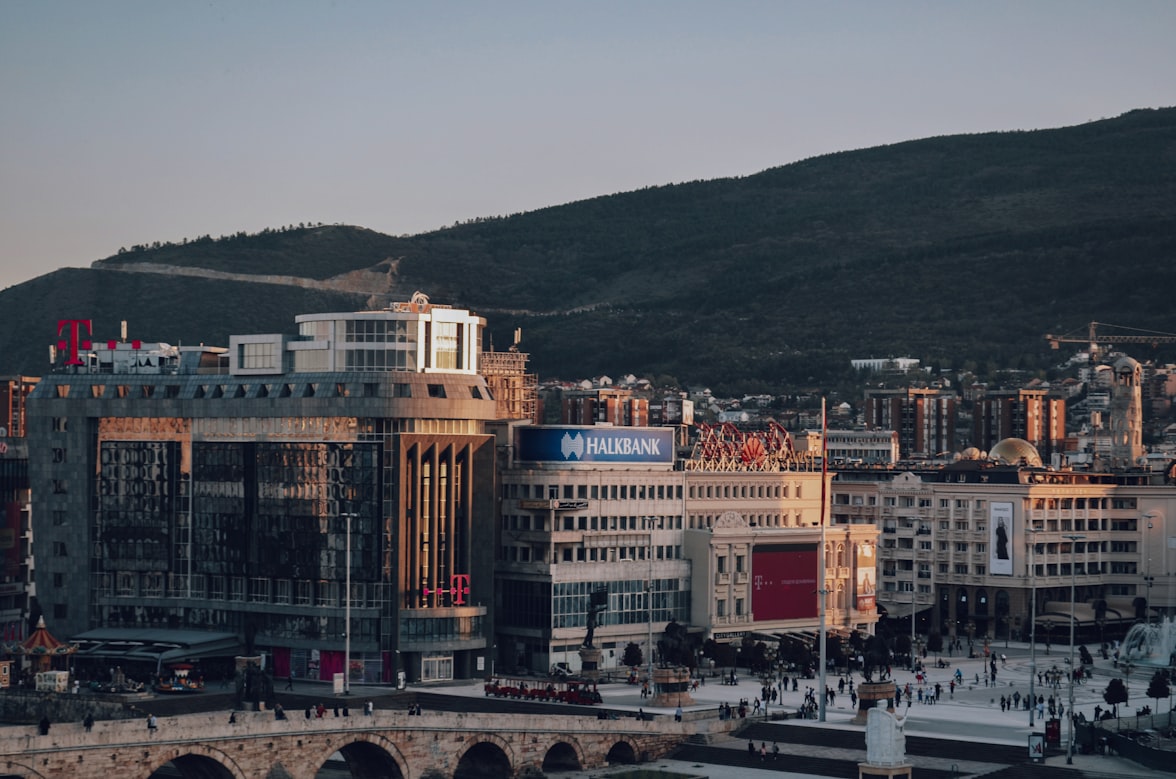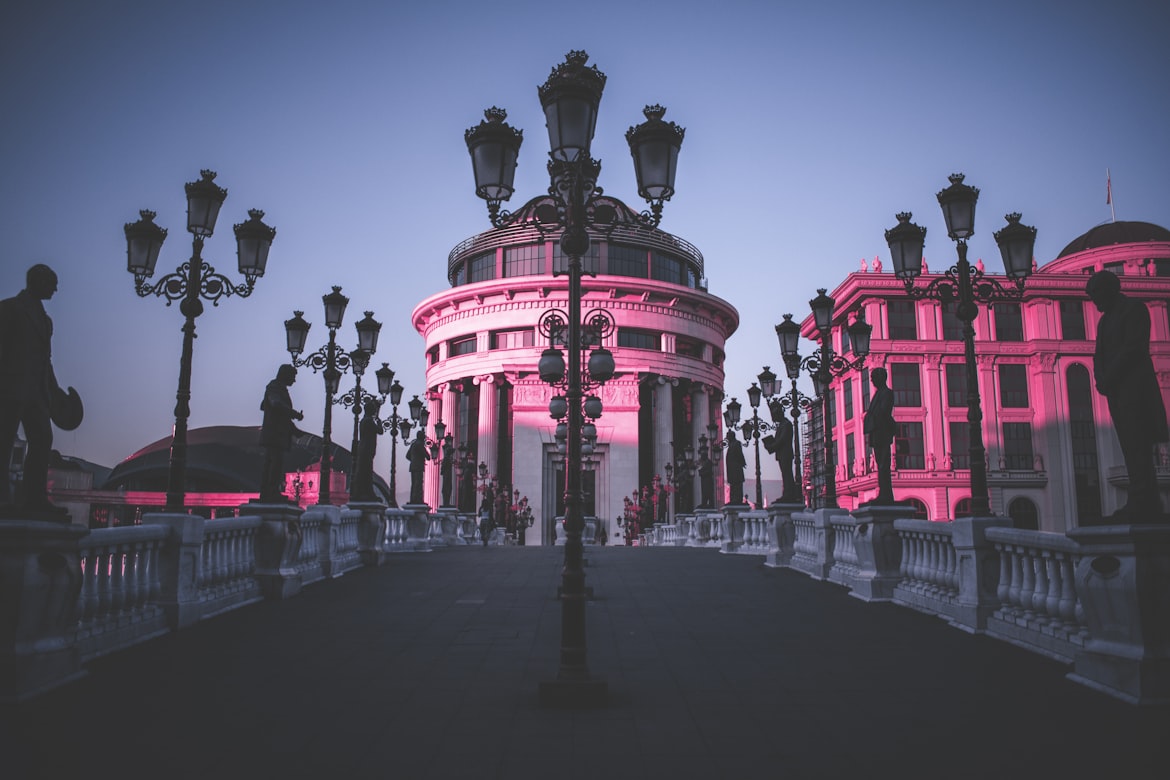Top Attractions
North Macedonia is a country steeped in history and natural beauty, offering visitors a rich tapestry of cultural and scenic experiences. Ohrid, a UNESCO World Heritage site, is perhaps the crown jewel, with its crystal-clear lake, medieval churches, and the ancient Theatre of Ohrid. Skopje, the capital, surprises travelers with its eclectic mix of Ottoman-era bazaars, neoclassical buildings, and grand statues in Macedonia Square. The Matka Canyon, just outside Skopje, provides a stunning natural escape with caves, cliffs, and tranquil boat rides. History lovers should not miss the ancient ruins of Heraclea Lyncestis near Bitola or the medieval fortress in Prilep. For panoramic views, the Galicica National Park offers incredible hikes between Lake Ohrid and Lake Prespa.
Local Dishes
North Macedonian cuisine is a flavorful blend of Balkan, Mediterranean, and Middle Eastern influences. A staple dish is tavče gravče, a traditional bean stew baked in a clay pot and often served with crusty bread. Ajvar, a pepper-based spread made with roasted red peppers and garlic, accompanies almost every meal. Pastrmajlija is a Macedonian-style pizza topped with cubed pork or lamb and a runny egg in the center. Cevapi, grilled minced meat sausages, are popular street food, especially in Skopje’s Old Bazaar. For dessert, baklava and tulumba sweeten the end of a hearty meal.
Transportation Tips
Public transportation in North Macedonia is affordable and relatively efficient. Buses connect most major cities and towns, though schedules can vary, especially in rural areas. In Skopje, the city bus system is robust, and the distinctive red double-decker buses are both nostalgic and practical. Taxis are widely available and inexpensive, but it’s best to agree on the fare beforehand or ensure the meter is used. Renting a car is recommended for exploring more remote areas like Mavrovo National Park or the mountain villages around Kratovo, especially if you're on a flexible itinerary.
Budget Travel Tips
North Macedonia is a budget-friendly destination, especially compared to Western Europe. Hostel beds in Skopje or Ohrid can be found for under €15, while guesthouses offer comfort for around €25–40 per night. Meals at local restaurants are generous and affordable, with traditional dishes costing just a few euros. Many top attractions, like lakes and churches, have little or no entry fee. Use intercity buses rather than taxis for long-distance travel, and consider visiting in the shoulder season for even better deals on accommodations and tours.
Safety Info
North Macedonia is generally considered a safe country for tourists. Violent crime is rare, and petty crime like pickpocketing is not widespread but can occur in busy markets or buses, so standard precautions are advised. Road conditions are improving, but rural and mountainous roads can be narrow or poorly lit. Tap water is safe to drink in most areas. Protests occasionally occur in Skopje; while they are usually peaceful, it’s best to avoid large gatherings. Solo travelers, including women, report feeling comfortable and welcome.
Cultural Etiquette
Macedonians are known for their hospitality, and guests are often warmly welcomed into homes and restaurants. A firm handshake is the standard greeting, and it's polite to address people with their titles, such as “Gospodin” (Mr.) or “Gospođa” (Mrs.). Shoes are typically removed when entering someone’s home. Dress modestly when visiting religious sites, and photography may be restricted inside churches. It’s customary to offer a small gift or flowers when invited to someone’s home.
Travel Style Fit
North Macedonia suits a wide range of travel styles. Cultural travelers will appreciate the country’s deep historical roots, monasteries, and Ottoman bazaars. Nature lovers can explore scenic gorges, mountains, and lakes. Foodies will enjoy traditional Balkan dishes and local markets. Adventure travelers will find opportunities for hiking, caving, and skiing. Solo travelers and digital nomads will appreciate the affordability, safety, and growing café culture, especially in Skopje and Ohrid. Whether you're a backpacker, history enthusiast, or someone looking for a laid-back lakeside escape, North Macedonia offers a surprisingly diverse and fulfilling experience.

Best Time to Visit
The best time to visit North Macedonia is during the late spring (May to June) and early autumn (September to October), when the weather is pleasant, and crowds are thinner. Summer months, especially July and August, are popular for visiting Lake Ohrid and the mountains, though it can get quite hot in Skopje and other inland cities. Winter is a great time for snow sports enthusiasts, with skiing and snowboarding available in Mavrovo and Popova Shapka.
Accommodation Recommendations
For budget travelers, Guesthouse Via Sakra in Ohrid offers a cozy stay just steps away from the lakefront and historic sites, with clean rooms and friendly hosts. Shanti Hostel in Skopje is another great option for backpackers, with communal vibes and organized tours.
For those seeking a balance between comfort and cost, Hotel Panoramika Design in Skopje provides modern amenities, panoramic views of the city, and an on-site restaurant, making it ideal for couples or solo travelers looking for a bit more luxury. Villa Mal Sveti Kliment in Ohrid combines historic charm with comfort, right in the heart of the Old Town.
Luxury seekers can indulge at the Marriott Hotel in Skopje, which overlooks Macedonia Square and offers elegant rooms, a spa, and fine dining. In Ohrid, Inex Gorica Hotel offers a lakeside retreat with upscale rooms, private beaches, and gourmet dining—a perfect base for unwinding in style.
Languages Spoken
Macedonian is the official language, written in the Cyrillic script. Albanian is also widely spoken, particularly in the western parts of the country. In tourist centers and urban areas, many younger people and service workers speak English. Learning a few basic Macedonian phrases like “Blagodaram” (thank you) or “Zdravo” (hello) is appreciated and goes a long way in fostering goodwill.
Currency
The official currency is the Macedonian denar (MKD). Credit cards are accepted in most hotels, supermarkets, and restaurants in urban areas, but cash is still king in rural regions and small businesses. ATMs are readily available in cities and tourist areas. It's advisable to carry small denominations for bus fares, local markets, and tipping.
Common Traveler Mistakes to Avoid
One common mistake is underestimating travel times between destinations due to the mountainous terrain and slower public transport. Travelers also often skip inland towns like Bitola or Kratovo in favor of Lake Ohrid, missing out on unique cultural experiences. Additionally, it’s easy to overlook the currency—many assume euros are widely accepted, but most businesses require payment in denars. Finally, not trying the local food or sticking only to international dishes means missing a huge part of the cultural experience.
Essential Apps & Tools
Maps.me or Google Maps is essential for navigating cities and national parks. The “Macedonia Travel” app, although basic, can provide helpful insights into cultural sites. Booking.com is the most commonly used platform for accommodations. A translation app like Google Translate (set to Macedonian) is useful for reading menus or signage in Cyrillic script.
Suggested Itinerary Styles
A recommended itinerary for North Macedonia includes starting in Skopje with two days exploring the city and nearby Matka Canyon, followed by a day in Bitola or Prilep for historical immersion. Spend three days in Ohrid to enjoy the lake, explore the churches and ancient ruins, and take a boat ride to Sveti Naum Monastery. Adventurers can add a couple of days in Mavrovo National Park for hiking or winter sports, depending on the season.
Fun Facts
North Macedonia is home to one of Europe’s oldest and deepest lakes—Lake Ohrid—believed to be over 3 million years old. The Millennium Cross on Vodno Mountain above Skopje is one of the largest Christian crosses in the world. The country is also a treasure trove for archaeologists, with over 4,000 archaeological sites. Despite its small size, North Macedonia boasts three national parks, showcasing incredible biodiversity and landscapes ranging from alpine peaks to serene lakes.
